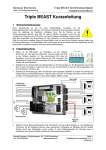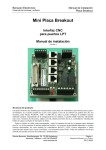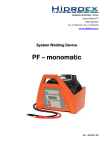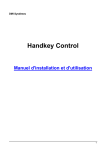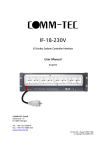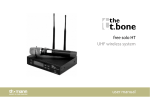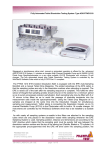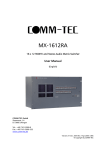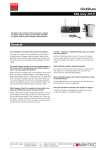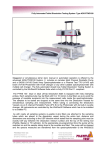Download Zero3 user manual - Prototools Prototype in House
Transcript
HYLEWICZ CNC-Technik www.cnc-step.de User Manual Zero3 5-channel stepper motor controller CNC-STEP Zero 3 5-channel stepper motor controller User Manual Brief description The “Zero3“ controller contains all the electronic equipment required for operating the router with up to four axes and up to five stepper motors. A PC with appropriate CNC controller software is needed for commissioning. This User‘s Manual describes the installation, commissioning and maintenance of the controller. Hylewicz CNC-Technik, Siemensstrasse 13-15 47608 Geldern, Germany Phone 0049 (0) 2831/133236 Page 1 12 January 2012 HYLEWICZ CNC-Technik www.cnc-step.de User Manual Zero3 5-channel stepper motor controller Contents 1 GENERAL INFORMATION.................................................................................. 3 1.1 Description of symbols .............................................................................................................................. 3 2 OVERVIEW OF FEATURES ................................................................................ 4 3 SAFETY MEASURES .......................................................................................... 5 3.1 3.2 Organizational safety measures ............................................................................................................... 5 Personnel selection and qualification, general duties............................................................................. 5 3.3 Safety warnings ......................................................................................................................................... 6 3.4 Safety instructions for specific phases of operation ............................................................................... 6 In normal operation ............................................................................................................................................. 6 During setup, maintenance, repair or disposal .................................................................................................... 6 3.5 Precautions for special types of danger................................................................................................... 7 Electrical power .................................................................................................................................................. 7 Gas, dust, sparking .............................................................................................................................................. 7 Hydraulic and pneumatic systems, steam............................................................................................................ 8 Oil, grease, gases and other chemical substances................................................................................................ 8 3.6 Safety devices............................................................................................................................................. 8 3.7 Possible risks to people ............................................................................................................................. 8 Remaining hazard points..................................................................................................................................... 8 3.8 4 Duties of the system operator................................................................................................................... 8 COMMISSIONING................................................................................................ 9 4.1 Installation ................................................................................................................................................. 9 4.2 Power supply line ...................................................................................................................................... 9 4.3 Connecting the machine............................................................................................................................ 9 Motor connectors (X1, X2, Y, Z)...................................................................................................................... 10 Rotating axis/tangential cutter (C) .................................................................................................................... 10 Control signals (ST) .......................................................................................................................................... 11 Status LEDs....................................................................................................................................................... 11 LPT ports .......................................................................................................................................................... 12 External loads (power outlets)........................................................................................................................... 13 4.4 5 Commissioning ........................................................................................................................................ 13 CLEANING AND SERVICING ........................................................................... 14 Procedure .......................................................................................................................................................... 14 5.1 Work in the interior of the housing ....................................................................................................... 14 Opening the housing ......................................................................................................................................... 15 Changing fuses.................................................................................................................................................. 15 DIP switch settings............................................................................................................................................ 15 Closing the housing........................................................................................................................................... 15 6 TECHNICAL SPECIFICATIONS ........................................................................ 16 6.1 Absolute maximum ratings .................................................................................................................... 16 6.2 6.3 Electrical connection values ................................................................................................................... 16 Housing dimensions ................................................................................................................................ 16 Hylewicz CNC-Technik, Siemensstrasse 13-15 47608 Geldern, Germany Phone 0049 (0) 2831/133236 Page 2 12 January 2012 HYLEWICZ CNC-Technik www.cnc-step.de User Manual Zero3 5-channel stepper motor controller 1 General information This stepper motor controller was designed according to all recognized guidelines in force at the time of its development and subject to extensive and careful testing. Despite this, no guarantee of trouble-free operation can be given. The developers guarantee that the Zero3 controller, when used in connection with appropriate mechanical components, is generally appropriate for use for the intended purpose in accordance with the description and User Manual. No responsibility is accepted for consequential damages or damages resulting from lost profits, interruption of operations, loss of information, etc. The Zero3 stepper motor controller is a component that only runs when connected to an appropriate personal computer and appropriate software. Under no circumstances is it an independent controller. Because, despite every effort, malfunction can never be entirely avoided, we are grateful for all feedback. 1.1 Description of symbols NOTE: Special information on efficient operation of the machine CAUTION: Special information on required or prohibited actions for avoiding damage. Information or requirements and prohibitions for preventing harm to persons or extensive damage to property Use by persons with a cardiac pacemaker prohibited This symbol appears before sections describing activities which are prohibited for persons with a pacemaker. High voltage warning symbol This sign warns of activities involving live components of the system. Hot surface warning symbol This symbol appears before sections describing activities where hot objects are handled. Hylewicz CNC-Technik, Siemensstrasse 13-15 47608 Geldern, Germany Phone 0049 (0) 2831/133236 Page 3 15 December 2011 HYLEWICZ CNC-Technik www.cnc-step.de User Manual Zero3 5-channel stepper motor controller 2 Overview of features Up to 4 axes or 5 stepper motors can be controlled. For one of the axes two motors can be used in parallel (X1, X2) The phase current for the motors of the X, Y and Z axes can be jointly set at 2.2 or 3.5A, as desired. The phase current of the C axis can be set separately in four steps between 1.4 and 3.5A. When it is not operating the motor current is automatically reduced to 66%. For each axis the step resolution can be separately set at 1/5 or 1/10 of a full step. This corresponds to 1,000 or 2,000 microsteps per revolution in the case of standard stepper motors (1.8° per full step). The 15-pin D-sub connection socket of the C axis has a 24V PWM output and a 12V power supply for controlling the tangential cutting modules. (e.g. TCM-3 or ETO-2) with or without an oscillating cutter. If an oscillating cutter is not used, the 24V output can alternatively be used for a brake. The four reference or limit switches and an E-STOP button can be connected via a 9-pin D-sub connector. A 0..10V analog signal for controlling the motor speed with an (external) frequency inverter is available via a 25pin D-sub port on the rear panel. The power supply for external consumers can be switched on and off by the software at two power outlets on the rear panel by means of two relays. They can each carry a load of 8A and have separate fuses. The current operating state of the controller can be read at any time using 12 LEDs on the front panel. Hylewicz CNC-Technik, Siemensstrasse 13-15 47608 Geldern, Germany Phone 0049 (0) 2831/133236 Page 4 15 December 2011 HYLEWICZ CNC-Technik www.cnc-step.de User Manual Zero3 5-channel stepper motor controller 3 Safety measures 3.1 Organizational safety measures • • • • • • • • • • • • • • The operating instructions must always be kept in an accessible position at the place where the machine is being operated (in the toolbox or in a container specified for it)! In addition to the user manual, the local general statutory or other binding regulations governing accident prevention and environmental protection are to be observed. Pass appropriate instructions on to operating personnel. Instructions, including supervision and reporting responsibilities, which take account of conditions specific to the factory, e.g. work organization, work procedures, and personnel, must be added to the user manual. If necessary or required by regulations, use personal protective equipment. Provide these for operating personnel too! At regular intervals check the safety and risk awareness of personnel and their compliance with the operating manual! Personnel must not wear long hair untied, loose clothing, or jewelry including rings. There is a risk of injury, such as becoming caught in the machine. Observe all safety and warning signs on the system at all times. All safety and danger warning signs on the system must always be kept in a complete and clearly legible condition. Maintain cleanliness and good order in the area of the system! If system operating behavior changes, switch it off immediately and report the fault to the department or person responsible for it! Do not make any changes, attachments or conversions to the system without permission. Replacement parts must be in compliance with the manufacturer’s technical requirements. Using genuine spare parts always ensures this. Observe the schedule laid down or specified in the operating instructions for routine checks and inspections! Appropriate workshop equipment is essential for carrying out maintenance measures. NOTE: The manufacturer’s documentation provided by suppliers must be observed. NOTE: Follow the special safety instructions in the individual chapters of this user manual. 3.2 Personnel selection and qualification, general duties • • • • • • Specify who is in charge of the system and authorize this person to refuse instructions from third parties which are not in compliance with safety regulations. Assign only trained or instructed personnel to the machine. Specify clearly the responsibility of personnel for operation, setup, maintenance and repairs! Work on/with the system may only be carried out by reliable personnel. (Observe the statutory minimum age.) Ensure that the system is only operated by personnel who are authorized to do so. Allow personnel undergoing training, instruction or familiarization with the system or those involved in general training to use the system only while under the uninterrupted supervision of someone experienced with the machine. All work on electrical system may only be carried out by personnel trained and qualified for this. Hylewicz CNC-Technik, Siemensstrasse 13-15 47608 Geldern, Germany Phone 0049 (0) 2831/133236 Page 5 15 December 2011 HYLEWICZ CNC-Technik www.cnc-step.de 3.3 User Manual Zero3 5-channel stepper motor controller Safety warnings The Zero3 step motor controller is sometimes exposed to high thermal loads. All conversions and alterations to the controller are carried out at the user’s risk and invalidate any warranty or warranty claims. The controller is equipped with forced air cooling. Under normal operating conditions the components which become hot reach temperatures of more than 70°C. Make sure there is an adequate air supply. In particular, the ventilation openings must not be closed, covered or clogged. In addition, all valid VDE regulations and CE standards must be observed. Especially when the power supply is being connected extreme caution is called for. Use separate and shielded cables when connecting motors and limit switches/reference switches. For motor cables we suggest wire gauge of at least 0.5 mm² (AWG 20). 3.4 Safety instructions for specific phases of operation In normal operation • • • • • • • Before switching the machine on, ensure that only authorized persons are in the working area of the system! Refrain from operating the machine in a manner that would impair safety! Initiate all measures to ensure that the machine is only operated in a safe and fully functioning condition. Do not operate the machine unless all guards and safety-related devices (e.g. detachable safety devices, E-Stop equipment, exhaust devices) are in place and operational. Check the system for any externally visible damage and defects at least once per shift! Report any changes that have occurred to the responsible department or person! If required, switch the system off immediately! In case of a malfunction, switch the system off immediately! Have faults repaired immediately! Observe start-up/shut-down processes and control indicators as specified in the user manual. NOTE: Follow the special safety instructions in the individual chapters of this user manual. During setup, maintenance, repair or disposal • • • • • • • • • Carry out the adjustment, maintenance and inspection activities specified in the operating instructions at the specified intervals! These activities may only be carried out by qualified personnel. Inform operating personnel before starting special work and maintenance! Nominate a supervisor! When carrying out work, observe the start-up/shut-down processes as specified in the user manual and the instructions for repair work! Cordon off a wide area around the maintenance zone where necessary! If the system has been completely shut down for service and repair work, it must be secured against unexpected restarting. This can be done by locking the main switch or placing warning sign on the main switch. During installation work above body height use only climbing aids intended for this purpose. Do not use parts of the system to assist in climbing! When carrying out maintenance work at greater heights make use of fall arrest equipment! Keep all handles, steps, railings, podiums, platforms and ladders free of dirt! Ensure that any screw connections loosened during service and maintenance work are always firmly retightened. If it is necessary to remove safety devices when setting up, servicing and repairing the machine, they must be reassembled immediately upon completion of the service and repair work and their correct function checked. Hylewicz CNC-Technik, Siemensstrasse 13-15 47608 Geldern, Germany Phone 0049 (0) 2831/133236 Page 6 15 December 2011 HYLEWICZ CNC-Technik www.cnc-step.de • User Manual Zero3 5-channel stepper motor controller Ensure that auxiliary and operating materials are disposed of in a safe and environmentally friendly manner. NOTE: Follow the special safety instructions in the individual chapters of this user manual. 3.5 Precautions for special types of danger Electrical power • Work on the electrical systems or operating units may only be carried out by a qualified electrician or by an instructed person under the supervision of a qualified electrician in compliance with respective regulations for electrical equipment. • Persons with a pacemaker are not allowed to enter areas with a control cabinet! • System parts on which maintenance, service and repair work is being carried out must be disconnected from the power supply if this is required. First check that disconnected parts are free of voltage then ground and short-circuit them and isolate live neighboring parts. • Use only original fuses with the electrical current for which they were designed! Turn the system off immediately if encountering any faults in the power supply! • The system’s electrical equipment must be inspected/checked regularly. Any faults, such as loose connections, damaged or cracked cable, must be repaired immediately. • If it becomes necessary to carry out work on live components, a second person must be called in who, in an emergency, can actuate the E-Stop or the main switch equipped with a voltage tripping mechanism. Cordon off the work area with a red and white safety chain and a warning sign. Use only non-conductive tools! NOTE: Follow the special safety instructions in the individual chapters of this user manual. Gas, dust, sparking • • • Carry out welding, thermal cutting/torch work and grinding operations on the system, only when this is explicitly authorized. There may, for example, be a risk of fire or explosion. Prior to welding, burning and grinding, clean the system and surrounding area of dust and combustible material and ensure there is sufficient ventilation (risk of explosion)! In the case of work in closed areas observe national regulations where these exist! Hylewicz CNC-Technik, Siemensstrasse 13-15 47608 Geldern, Germany Phone 0049 (0) 2831/133236 Page 7 15 December 2011 HYLEWICZ CNC-Technik www.cnc-step.de User Manual Zero3 5-channel stepper motor controller Hydraulic and pneumatic systems, steam • • • • Only personnel with special knowledge and experience with hydraulic systems are permitted to carry out work on hydraulic equipment. Check all lines, hoses and screw couplings regularly for leaks and externally visible damage! Repair any damage immediately! Squirting oil can cause injury and is a fire hazard. Before commencing repair work release pressure from the system sections and pressure lines (hydraulic fluid, compressed air, coolants) which are to be opened according to the unit specifications! Move and mount hydraulic, coolant and compressed air lines properly! Connections must not be mixed up! Fittings, length and quality of hose lines must meet technical requirements. Oil, grease, gases and other chemical substances • • 3.6 When handling oil, grease, gases and other chemical substances, follow the safety instructions applicable to the product! Exercise caution when handling hot auxiliary and operating materials (risk of burning or scalding)! Safety devices • 3.7 Emergency stop device with E-stop switches on the controller housing. (E-stop chain as prescribed by applicable regulations) Possible risks to people Remaining hazard points • • • 3.8 The safety equipment on the system is based on many years experience and conforms to relevant regulations. Nonetheless, hazards arising from handling systems cannot be ruled out completely. Operating and service personnel need to be thoroughly familiar with remaining hazard points and always carry out work on the system with appropriate attention to these in order to avoid risks to life and limb of people or impairments of the machine and other real assets. Safety equipment or safety measures are only fully effective if the machine is used as specified. Particular caution is necessary in operating modes where safety equipment is limited (setup, maintenance, repairs). Duties of the system operator • • • System safety can only be achieved during regular operation if all measures required for such safety are adopted. The operator of the system is responsible for planning these measures and checking that they are carried out. The system operator is required to maintain safety equipment on the system and in its periphery in the condition they were in at the time it commenced operating. The user must guarantee the cleanliness and neatness of the work space by means of appropriate instructions and checks. In addition the operator should explain and teach operating personnel safety conscious behavior by means of internal application-specific rules and protective measures. Hylewicz CNC-Technik, Siemensstrasse 13-15 47608 Geldern, Germany Phone 0049 (0) 2831/133236 Page 8 15 December 2011 HYLEWICZ CNC-Technik www.cnc-step.de User Manual Zero3 5-channel stepper motor controller 4 Commissioning 4.1 Installation The controller should be installed in such a way that the controls on the front panel, especially the E-Stop switch, are freely accessible at all times. There should be free air flow to the ventilation openings on the housing. Appropriate measures (housing, protective walls, suction ...) should be adopted to ensure that the controller remains free of shavings, dust and liquids (oil, cooling water). Metal swarf and cooling water can cause short circuits. Dust can interfere with ventilation and thus cause overheating. Both of these can lead to irreparable damage and risk of fire. 4.2 Power supply line The controller is equipped with a universal AC adapter and can be operated without adjustment using line voltages from 115 to 240VAC. If you are operating the equipment in a foreign country make sure that you use only appropriate and authorized power cord and power outlet adapters. These must have a PE conductor and be designed for a load of up to 16A. 4.3 Connecting the machine Connections for the positioning motors (connectors X1, X2, Y and Z), the rotating axis or tangential unit (connector C), if present, and the end position switches and E-stop switches (connector ST) are located on the front panel. Before connecting the connector make sure that the assignment of individual contacts corresponds to the schematic shown below. • Incompatible connections lead to the risk of damaging parts of the controller or destroying it. • In addition, the proper functioning of the system can be reduced through this and safety functions which serve to protect life and limb can be disabled. Insert or remove connectors only with the controller switched off! • • Always lock connectors using the screws located on the connector housing. The electronic equipment is protected against short-circuits and interruption of the motor cable. However, unreliable contacts can lead to incorrect positioning and/or arcing, which can result in breakage of tools, destruction of the workpiece or reduction of the service life of the system. Hylewicz CNC-Technik, Siemensstrasse 13-15 47608 Geldern, Germany Phone 0049 (0) 2831/133236 Page 9 15 December 2011 HYLEWICZ CNC-Technik www.cnc-step.de User Manual Zero3 5-channel stepper motor controller Motor connectors (X1, X2, Y, Z) Pin no. Signal 1+6 Motor winding A+ 2+7 Motor winding A- 3+8 Motor winding B+ 4+9 Motor winding B- 5 Ground, shield For motors with 3A or higher current a wire gauge of at least 0.5mm² (AWG 20) must be used and both pins must always be connected for each wire. For motors with lower current, 0.34mm² and one pin are sufficient. Shielding can be connected to either pin 5 or the sheet metal collar of the connector. The motor outputs are short-circuit proof (interturn fault and short circuit). Rotating axis/tangential cutter (C) The fifth axis can be used optionally either for a rotating axis (dividing head) or a tangential cutter. So that this axis can be upgraded later without having to change existing wiring, all the necessary additional signals are available on this connector. Pin no. Signal 1+9 Stepper motor winding A+ 2+10 Stepper motor winding A- 3+11 Stepper motor winding B+ 4+12 Stepper motor winding B- 7+8 Oscillating motor +12..24V (max. 3A) 14+15 Oscillating motor GND 13 Limit switch C 5 Signal ground, shielding 6 Fan, sensor +12V max. 150mA Stepper motor, oscillating motor and 12V output are all short-circuit proof. Nonetheless, because the 12V supply is also used internally, malfunctions of the controller are possible in the event of a short circuit. Pins 5 and 14-15 (GND) are connected internally, but should be separately wired in order to prevent disruptions to the limit switch signals by the motor. The limit switch can be a NC or a NO contact depending on ground. The polarity can be selected in the software (e.g. WinPCNC or Mach3). Hylewicz CNC-Technik, Siemensstrasse 13-15 47608 Geldern, Germany Phone 0049 (0) 2831/133236 Page 10 15 December 2011 HYLEWICZ CNC-Technik www.cnc-step.de User Manual Zero3 5-channel stepper motor controller Control signals (ST) The limiting switch and the E-stop switch are connected at this connector. All switches connect ground with the respective input. The E-stop switch must be NC (normally closed). The limit switch can be an NC or NO (normally open) contact switched to ground. The polarity can be selected in the software (e.g. WinPCNC or Mach3). Pin no. Signal 1 Limit switch C or tool probe 2 Limit switch X 3 Limit switch Y 4 Limit switch Z 5 E-stop switch (closed = OK, open = stop) 6 Unused (optional 12V sensor provision) 7 Optional brake +24V 8 Optional brake for ground 9 Ground, shield Status LEDs Several LEDs for indicating the operating condition are mounted on the front plate (numbered from left to right). LED no. Color Symbol Meaning 1 Green Power (controller switched on) 2 Green 3 Yellow Running (current reduction when off) 4 Yellow Relay 1 (spindle on) 5 Yellow Relay 2 (cooling, suction) 6 Red Emergency stop (mushroom button or ext. input) 7 Red Malfunction X1 axis 8 Red Malfunction X2 axis 9 Red 10 Red 11 Red Malfunction C axis 12 Red Malfunction oscillating motor or brake PC ! Ready (PC software ready, toggle signal) Malfunction Y axis Malfunction Z axis Some special conditions are indicated with flashing signals: • Overheating: LEDs 7-12 flash simultaneously • Excess voltage: LEDs 1 and 7-12 flash simultaneously • Low voltage: LED 1 flashes Hylewicz CNC-Technik, Siemensstrasse 13-15 47608 Geldern, Germany Phone 0049 (0) 2831/133236 Page 11 15 December 2011 HYLEWICZ CNC-Technik User Manual Zero3 5-channel stepper motor controller www.cnc-step.de LPT ports The connection with the controller PC is by means of a 25-pin D-sub connector (LPT = parallel port) on the rear panel. Most signals for basic functions (phase/direction, spindle on/off, etc.) are available on the left connector. The plug-in connector on the controller is male, i.e. to connect it with the PC a 1:1 extension cable with a male/female plug is required. The pins are assigned as follows: Pin no. description Pin no. description 1 Relay 1 (spindle) 14 Relay 2 (cooling/suction) 2 Direction X1 and X2 15 Ref. switch 4. Axis or tool probe 3 Cycle X1 and X2 16 Watchdog (toggle/charge pump) 4 Direction Y 17 Spindle speed PWM 5 6 7 8 9 10 11 12 13 Cycle Y Direction Z Cycle Z Direction 4th axis (C) Cycle 5th axis 18 19 20 21 22 23 24 25 Signal ground Reference switch Z E-Stop (low active) Reference switch Y Reference switches X1 and X2 A second LPT port is provided for controlling a tool changer and frequency inverter (see the illustration at the top right). The connector to the PC is male, the one for the tool changer/frequency inverter is female. The pin assignment is as follows: Pin no. description 1 2 3 4 5 6 7 8 9 10 11 12 13 Motor on/off (open collector) Looped through, available Pin no. description 14 15 16 17 18 19 20 21 22 23 24 25 Looped through, available 0..10V Speed target value Signal ground Hylewicz CNC-Technik, Siemensstrasse 13-15 47608 Geldern, Germany Phone 0049 (0) 2831/133236 Page 12 15 December 2011 HYLEWICZ CNC-Technik www.cnc-step.de User Manual Zero3 5-channel stepper motor controller Pin no. 1 is an open-collector signal, i.e. it is switched to ground whenever the spindle motor is switched on and can be used to control (start/stop input) a frequency inverter (max. 30V 50mA). Pin no. 18 is the analog motor speed signal. It is short-circuit-proof so that no damage is caused if a normal LPT cable (Pin 18=ground) is accidentally connected. External loads (power outlets) Two 230V external loads can be connected to the two power outlets on the rear panel. The left-hand power outlet, looking at it from the rear, is controlled by relay 1 and is normally used for the spindle motor. The righthand power outlet is controlled by relay 2 and can be optionally used for a vacuum cleaner, a coolant pump or other sub-assemblies. The maximum current consumption of each external load must not exceed 8A. The total current consumption must not exceed 13.5A (16A minus the maximum current used by the machine itself). Please note that the maximum current consumption can be higher than is to be expected from the rated performance of the device. The maximum current consumption also taking account of start-up and idling current is stated on the nameplate or in the manufacturer documentation. Exceeding the maximum current leads to tripping of the fuses located in the interior of the housing. 4.4 Commissioning Before final commissioning please check once again that all plug-in connectors are correctly mounted and the locking screws are tight. After this you can switch on the PC and install and launch the controller software. • Carry out the required setting of machine parameters according to the controller software user manual. • Prior to the first test run make sure that there are no tools in the collet of the spindle motor and no workpiece or other objects on the work surface. If necessary, rotate the positioning drives into a safe position with sufficient distance to the final positions. Close the covers or make sure that nobody is present within the hazardous area. • Insert the power plug of the controller only now and switch the controller on at the main switch. • Start by checking that the end position switches and all E-stop switches are functioning correctly. • Check that the stepper motors are rotating in the correct direction using manual travel (jogging) at slow speed (e.g. 1mm/s). Check whether the displayed travel path corresponds with the path actually traversed (adjustment steps/mm). • In the event that anything fails to function as expected, switch off the machine at once and check the connections as well as the software settings. If all switches function as expected and the directions of movement and distances traversed are correct, you can carry out a reference run (homing). The machine is ready for operation. In order to familiarize yourself with operating the machine it is recommended that, before the first “real” processing operation you allow a CNC program to run “in thin air,“ i.e., without the tool, material or workpiece. • Hylewicz CNC-Technik, Siemensstrasse 13-15 47608 Geldern, Germany Phone 0049 (0) 2831/133236 Page 13 15 December 2011 HYLEWICZ CNC-Technik www.cnc-step.de User Manual Zero3 5-channel stepper motor controller 5 Cleaning and servicing The controller normally runs without wear and requires no maintenance. In order to ensure correct function and safe operation it is necessary to regularly check that all connections are in good condition and that air supply to the ventilation openings of the housing is unhindered. Procedure 5.1 • Switch the controller off at the main switch and unplug the power plug. • Wait approximately 2 minutes to allow the energy stored in the capacitors can discharge. • Check the power supply, the power supply cords of external consumers and all motor cables for visible signs of damage. Damaged or cracked lines must be replaced at once. • Check the ventilation slots on the front and rear panels. They must be free of swarf and accumulated dust. If necessary, clean the slots with a vacuum cleaner. Avoid blowing them clean with compressed air under any circumstances! This could lead to swarf being blown into the interior of the controller. Swarf and small parts could break free and cause injuries. Use a paintbrush or soft brush if there is stubborn soiling. • If necessary clean the surface of the housing with a slightly damp cloth. Avoid using aggressive cleaning agents or solvents. If liquid gets into the housing by mistake DO NOT start using the equipment again, but have it checked by a specialist. Work in the interior of the housing There is normally no maintenance required for the inside of the housing. Repairs may only be carried out by the manufacturer or authorized workshops. Exceptions are changing fuses and changing the factory settings with the help of the DIP switch. In the case of all work which requires opening the housing, be sure to pay attention to the following points: • Switch the controller off at the main switch and unplug the power plug. • Wait approximately 2 minutes to allow the energy stored in the capacitors can discharge. • If these instructions are not followed there is the risk of serious or fatal injuries due to electric shock! The controller can also be damaged if objects accidentally fall into it when opening the housing. • If the controller is opened directly after being in use the temperature of individual components in the controller may still be over 50°C. There is danger of burning if these are touched. We therefore recommend a cooling off period of 30 minutes • Carefully save all screws and disassembled small parts. When putting it back together, be sure to reinstall all original parts in the places intended for them. Screws that are too long can cause short-circuits or damage components on the inside. • Metal housing parts must be connected to the PE conductor. During reassembly, be absolutely sure to reconnect all ground lines and to firmly tighten the screws. Hylewicz CNC-Technik, Siemensstrasse 13-15 47608 Geldern, Germany Phone 0049 (0) 2831/133236 Page 14 15 December 2011 HYLEWICZ CNC-Technik www.cnc-step.de User Manual Zero3 5-channel stepper motor controller Opening the housing • Remove the aluminum profiles on the top left side by unscrewing one of the round-head screws on the front and rear wall respectively. • Loosen the screw of the housing cover and remove it. • If possible, leave the side elements, the front panel and rear panel in place. Changing fuses The fuses are located in two plastic fuse holders (green components on the right in the picture). Start by removing the upper section of the fuse holder and check the fuse with a continuity tester. Then replace the fuse if necessary and place the top part of the holder back in the PCB. Caution! Use only fuses with the same value (slowblow 8A) and rated for the voltage used (250V~). If the fuse trips frequently the connected external consumer has excessive current consumption or is defective. Never install fuses with higher amperage! DIP switch settings The switches are located on the edge of the PCB next to the fuses (the blue component in the picture above). They are numbered from 1 to 8 and the ON position is marked “ON.“ No. 1 2 3 4 5 6 Meaning Resolution X axis (OFF=1/10, ON=1/5 microstep) Resolution Y axis Resolution Z axis Resolution C axis Current of C motor 5=OFF 6=OFF: 1,4A, 5=ON 6=OFF: 2.0A, 5=OFF 6=ON: 2.8A, 5=ON 6=ON: 3.5A Current of XYZ motors (OFF=2.2A, ON=3.5A) Assignment of the 24V output (OFF = oscillation motor PWM controlled, ON = brake) 7 8 Caution! The DIP switches are normally already set correctly at the factory for the supplied machine. Changes are only required if the controller is to be operated with a different machine. Never set the current higher than in the specifications for the stepper motors. Doing so can lead to overheating of the motors or the cables and damage them. Closing the housing • • • Check whether all plug-in connectors and lines that may have been removed are back in place, especially the ground connections of the housing components (green/amber). Insert the housing cover in the profile on the right and screw the cover firmly onto the power supply unit. Insert the top left aluminum profile and screw it firmly to the front and rear panels. Hylewicz CNC-Technik, Siemensstrasse 13-15 47608 Geldern, Germany Phone 0049 (0) 2831/133236 Page 15 15 December 2011 HYLEWICZ CNC-Technik User Manual Zero3 5-channel stepper motor controller www.cnc-step.de 6 Technical specifications 6.1 Absolute maximum ratings In order to avoid equipment damage, under no circumstances should the following parameters be exceeded: Parameters Power supply Min. - Max. 264 Unit Vac 16 Aac -5 +5,5 V Voltage at LPT2 pin 1 -0,5 +30 V Voltage at LPT2 pin 18 -0,5 +12 V Storage temperature -40 +85 °C Parameters Power supply +10% ~ -15% Min. 115 Max. 240 Line frequency 47 Current consumption including external consumers Voltage at LPT1 signal inputs and outputs 6.2 Electrical connection values Unit Vac 63 Hz 2,5 Aac 0 +40 °C Level logical 0 for LPT signal inputs and outputs -0.5 +0.8 V Level logical 1 for signal inputs +2.5 +5 V Input resistance for signal inputs 1 1.5 kΩ Current consumption (with power supply unit, without ext. consumers) Ambient temperature during operation Pulse width for step signal Setup time for direction signal valid until step 2 1 Step frequency µs 0 µs 0 100 kHz Delay time prior to automatic current reduction 0.5 0.7 s Excess temperature response threshold 70 85 °C Precision of current control -10 +10 Number of microsteps per full step Microsteps/revolutions using a standard motor2 6.3 % 5, 10 - 1000, 2000 - Housing dimensions Parameters Length (without connection and operating elements) Type 260 Unit mm Width 251 mm Height 130 mm Weight (without cord) 2,5 kg 1 Step is executed during rising edge, i.e. transition from logical 0 to logical 1 (rise of a pulse) 2 Standard motor: 1.8°/full step, 200 full steps/revolution Hylewicz CNC-Technik, Siemensstrasse 13-15 47608 Geldern, Germany Phone 0049 (0) 2831/133236 Page 16 15 December 2011

















